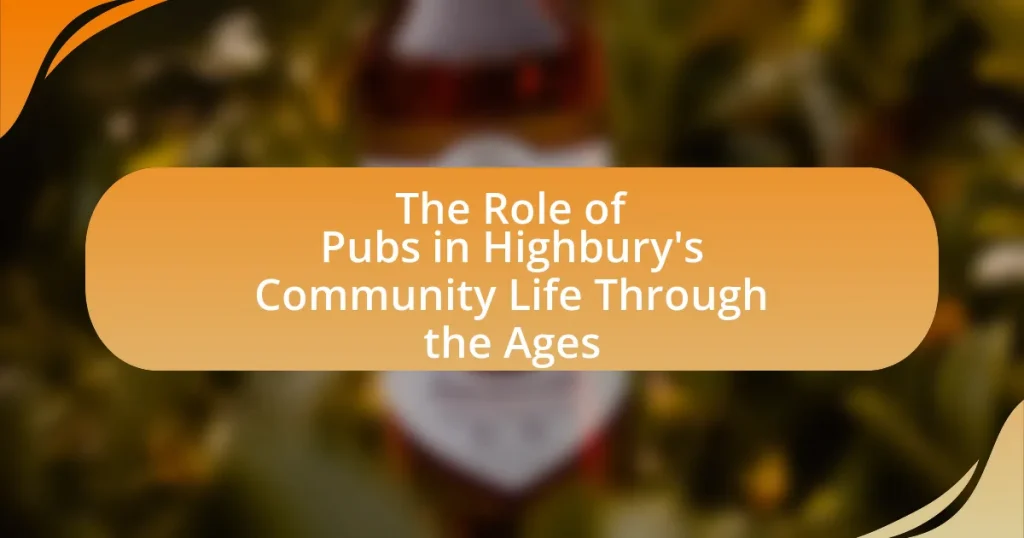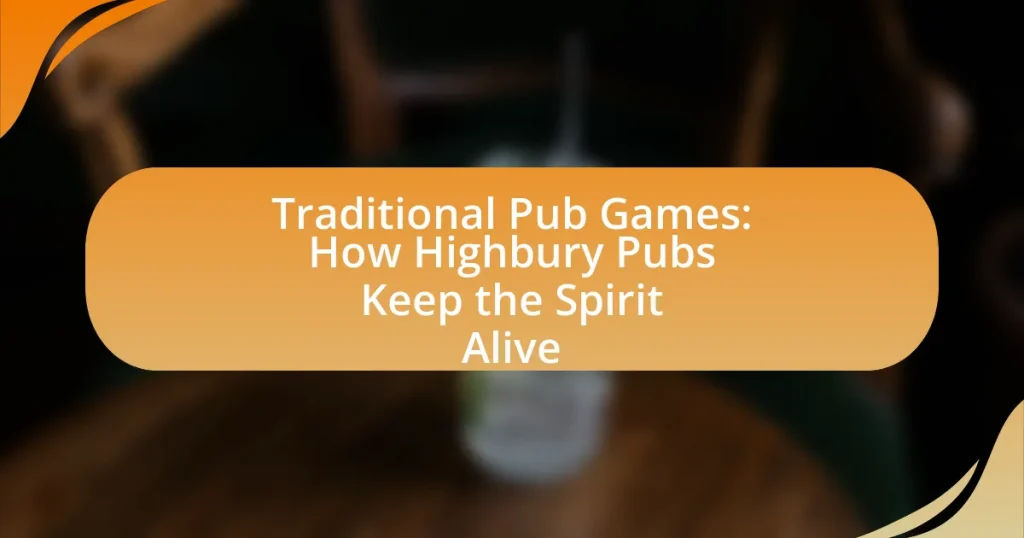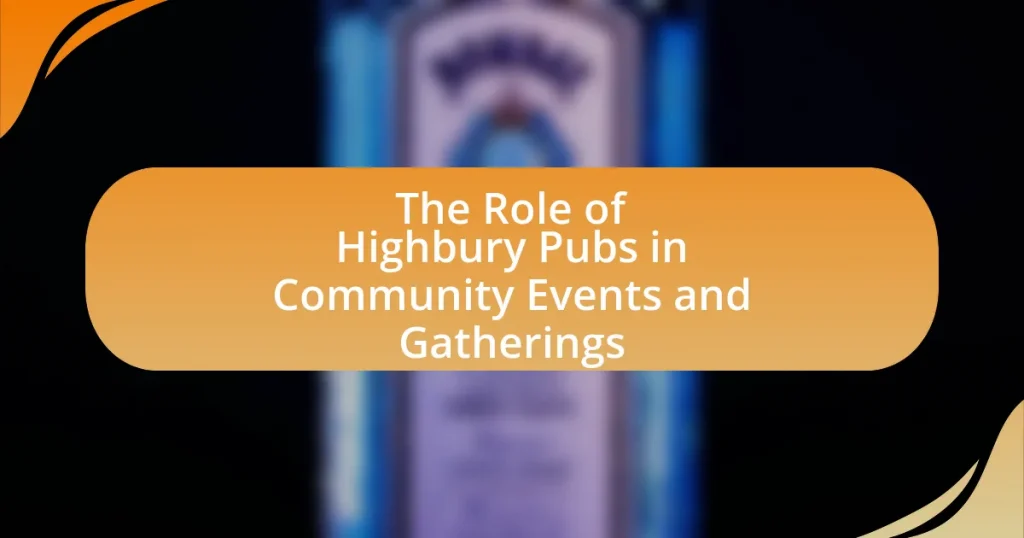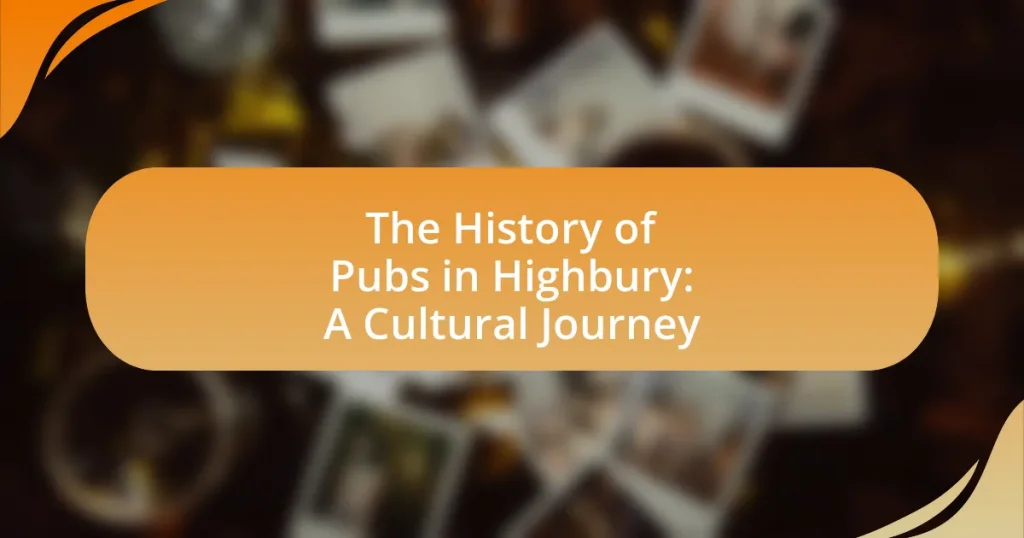The article examines the historical and contemporary significance of pubs in Highbury’s community life. It outlines the evolution of these establishments from 16th-century alehouses to modern venues that cater to diverse social needs. Key topics include the role of pubs in fostering social connections, hosting community events, and influencing local politics, as well as the challenges they face today, such as rising operational costs and competition from alternative social venues. The article also highlights strategies for ensuring the continued relevance of pubs, emphasizing the importance of community support and engagement in maintaining these vital social hubs.
What has been the historical significance of pubs in Highbury’s community life?
Pubs have historically served as vital social hubs in Highbury’s community life, fostering connections among residents. These establishments have provided a space for social interaction, cultural exchange, and community events, contributing to the local identity. For instance, during the 19th century, pubs became central to working-class social life, often hosting meetings and celebrations that reinforced community ties. Additionally, pubs have played a role in local politics, serving as venues for discussions and gatherings that influenced civic engagement. The consistent presence of pubs in Highbury reflects their enduring significance in shaping the social fabric of the area.
How have pubs evolved in Highbury over the centuries?
Pubs in Highbury have evolved significantly over the centuries, transitioning from basic alehouses in the 18th century to modern establishments that serve diverse food and drink options. Initially, these pubs functioned primarily as places for locals to gather and consume ale, reflecting the community’s social needs. As urbanization progressed in the 19th century, the number of pubs increased, and they began to offer more amenities, such as dining areas and entertainment, catering to a broader demographic. By the 20th century, pubs in Highbury adapted to changing social norms and consumer preferences, incorporating features like craft beers and themed events, which further solidified their role as central hubs in community life. This evolution illustrates how pubs have continuously responded to societal changes while maintaining their status as vital social spaces in Highbury.
What were the earliest forms of pubs in Highbury?
The earliest forms of pubs in Highbury were primarily alehouses and taverns that served as social gathering places for the local community. These establishments emerged in the 16th and 17th centuries, providing not only alcoholic beverages but also food and lodging. Historical records indicate that these pubs played a crucial role in community life, acting as venues for social interaction, local meetings, and events, thereby fostering a sense of belonging among residents.
How did social and economic changes influence pub development?
Social and economic changes significantly influenced pub development by altering the demographics and consumption patterns within communities. For instance, the Industrial Revolution led to urbanization, increasing the working-class population in cities like Highbury, which in turn created a higher demand for local pubs as social gathering places. Additionally, economic prosperity during the post-war period resulted in increased disposable income, allowing more people to frequent pubs, thus expanding their role as community hubs. Historical data indicates that the number of pubs in urban areas rose sharply during these periods, reflecting their adaptation to changing social dynamics and economic conditions.
What role did pubs play in community gatherings and events?
Pubs served as central venues for community gatherings and events, fostering social interaction and local culture. Historically, they provided a space for residents to meet, celebrate, and engage in communal activities, such as quiz nights, live music, and seasonal festivals. For example, in Highbury, pubs have hosted events like charity fundraisers and holiday celebrations, reinforcing community bonds and local identity. This role is supported by sociological studies indicating that public houses contribute significantly to social cohesion and community engagement, highlighting their importance in local life.
How have pubs served as venues for local celebrations?
Pubs have served as venues for local celebrations by providing a communal space where residents gather to mark significant events. Historically, pubs have hosted festivities such as birthdays, weddings, and seasonal celebrations, fostering a sense of community and belonging. For example, during local festivals, pubs often organize events that include live music, food specials, and themed decorations, which enhance the celebratory atmosphere. This role is supported by the fact that pubs are often central to local culture, acting as informal community hubs where people can connect and celebrate together.
What impact did pubs have on local politics and social movements?
Pubs significantly influenced local politics and social movements by serving as informal gathering spaces for community discussions and organizing efforts. Historically, pubs have acted as venues where individuals could engage in political discourse, share ideas, and mobilize support for various causes, such as labor rights and social reforms. For example, during the 19th century, many pubs in England became hubs for the Chartist movement, where working-class individuals gathered to advocate for political representation and voting rights. This role in facilitating dialogue and community engagement underscores the importance of pubs in shaping local political landscapes and fostering social change.
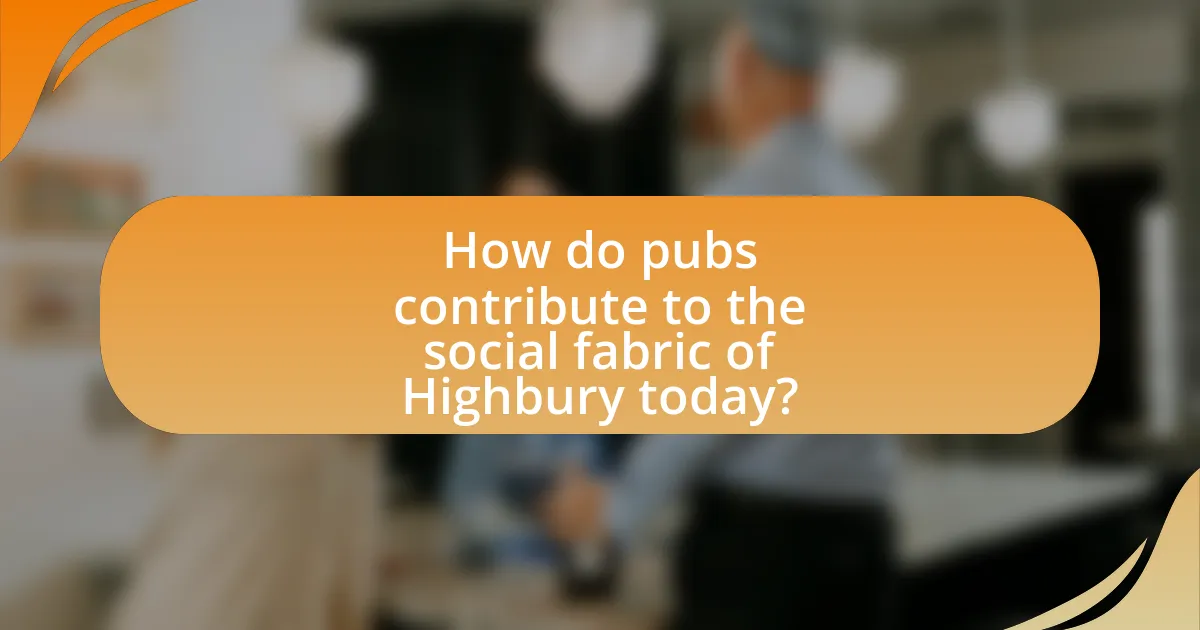
How do pubs contribute to the social fabric of Highbury today?
Pubs contribute significantly to the social fabric of Highbury today by serving as communal gathering spaces that foster social interaction and community engagement. These establishments provide a venue for residents to connect, share experiences, and participate in local events, thereby strengthening neighborhood ties. For instance, many pubs in Highbury host quiz nights, live music, and community fundraisers, which not only entertain but also encourage collaboration among locals. Additionally, research from the Campaign for Real Ale (CAMRA) indicates that pubs play a vital role in reducing social isolation, particularly among older adults, by offering a welcoming environment for socializing. This evidence underscores the importance of pubs as integral components of Highbury’s community life.
What types of community activities are hosted in Highbury’s pubs?
Highbury’s pubs host a variety of community activities, including quiz nights, live music events, and charity fundraisers. These activities foster social interaction and community engagement, making pubs central to local culture. For example, quiz nights often attract teams from the neighborhood, promoting camaraderie and friendly competition. Live music events showcase local talent, enhancing the cultural landscape of Highbury. Charity fundraisers organized in these pubs contribute to local causes, reinforcing the pubs’ role as community hubs.
How do pubs support local arts and culture?
Pubs support local arts and culture by providing a venue for performances, exhibitions, and community events that showcase local talent. They often host live music, art shows, and poetry readings, creating a platform for artists to reach wider audiences. For example, many pubs in Highbury collaborate with local artists to display their work, fostering a sense of community and cultural engagement. Additionally, pubs may sponsor local art festivals or cultural initiatives, further enhancing their role as cultural hubs. This involvement not only enriches the local arts scene but also attracts patrons who appreciate and support these cultural activities.
What role do pubs play in fostering community relationships?
Pubs play a crucial role in fostering community relationships by serving as social hubs where individuals gather, interact, and build connections. These establishments provide a relaxed environment that encourages conversation and camaraderie among patrons, which strengthens local ties. Research indicates that regular social interactions in communal spaces, such as pubs, contribute to a sense of belonging and community cohesion. For example, a study published in the Journal of Community Psychology highlights that community spaces like pubs facilitate social networks and support systems, enhancing overall community well-being.
How do pubs adapt to changing community needs?
Pubs adapt to changing community needs by diversifying their offerings and engaging with local events. For instance, many pubs have expanded their menus to include healthier options and accommodate dietary restrictions, reflecting the growing demand for inclusivity in food choices. Additionally, pubs often host community events such as quiz nights, live music, and charity fundraisers, which foster social interaction and strengthen community ties. Research indicates that pubs that actively participate in local initiatives see increased patronage and community support, demonstrating their role as vital social hubs.
What innovations have pubs implemented to attract diverse patrons?
Pubs have implemented various innovations to attract diverse patrons, including themed events, inclusive menus, and community engagement initiatives. Themed events, such as cultural nights or live music from different genres, create an inviting atmosphere for various demographics. Inclusive menus that cater to dietary restrictions, such as vegan or gluten-free options, ensure that all patrons feel welcome. Additionally, community engagement initiatives, like partnerships with local organizations and hosting charity events, foster a sense of belonging and encourage participation from a broader audience. These strategies have been shown to increase foot traffic and enhance the social fabric of the community.
How do pubs respond to public health and safety concerns?
Pubs respond to public health and safety concerns by implementing measures such as enhanced sanitation protocols, social distancing guidelines, and staff training on health regulations. For instance, during the COVID-19 pandemic, many pubs adopted rigorous cleaning schedules, installed barriers, and limited capacity to ensure customer safety. These actions are supported by public health guidelines from organizations like the World Health Organization, which emphasize the importance of hygiene and social distancing in preventing disease transmission.
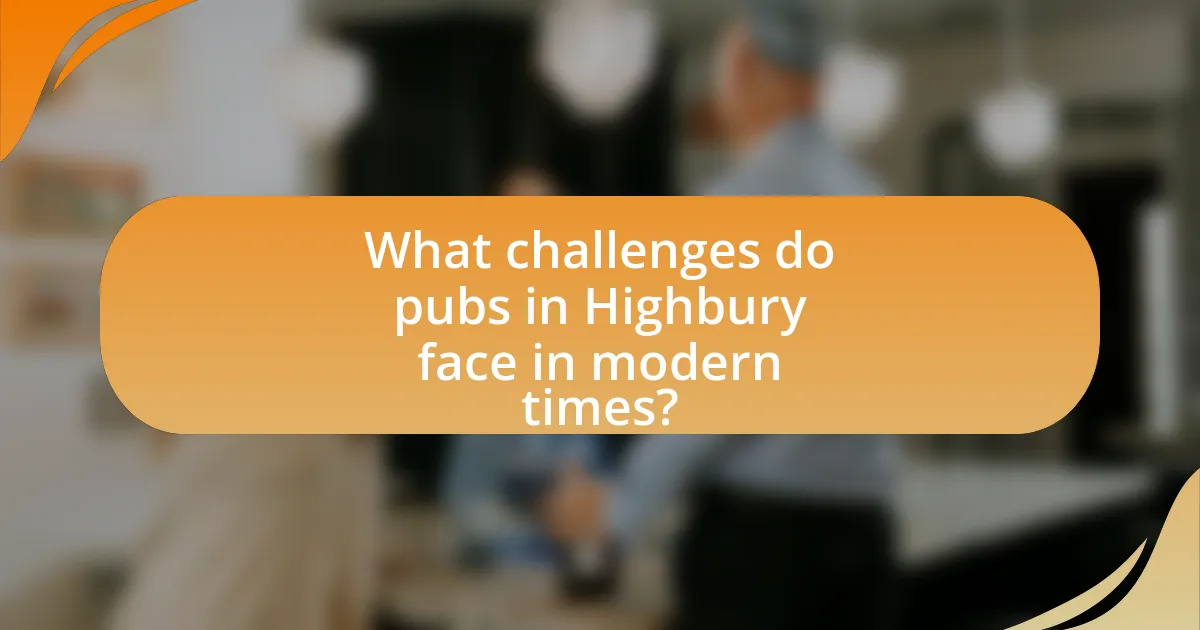
What challenges do pubs in Highbury face in modern times?
Pubs in Highbury face several challenges in modern times, including increased competition from alternative social venues, rising operational costs, and changing consumer preferences. The proliferation of bars, restaurants, and cafes has intensified competition, making it difficult for traditional pubs to attract patrons. Additionally, operational costs, such as rent and staff wages, have risen significantly, impacting profitability. Furthermore, younger generations are increasingly favoring experiences over traditional pub culture, leading to a decline in regular pub attendance. These factors collectively threaten the viability of pubs in Highbury, as evidenced by the closure of numerous establishments in recent years.
How has the rise of digital culture affected traditional pubs?
The rise of digital culture has significantly affected traditional pubs by shifting social interactions from physical spaces to online platforms. As more people engage in socializing through social media and digital communication, traditional pubs have experienced a decline in foot traffic and patronage. According to a report by the British Beer and Pub Association, pub closures in the UK increased by 1,000 in 2020, partly attributed to changing social habits influenced by digital technology. This shift has led pubs to adapt by incorporating digital elements, such as online booking systems and social media marketing, to attract customers and remain relevant in a digitally dominated social landscape.
What strategies are pubs using to compete with online entertainment?
Pubs are employing various strategies to compete with online entertainment, including enhancing the social experience, offering unique events, and leveraging technology. By creating an inviting atmosphere that fosters social interaction, pubs attract patrons seeking community engagement, which online platforms cannot replicate. Additionally, many pubs host live music, quiz nights, and themed events to draw in crowds, providing entertainment that encourages in-person attendance. Furthermore, the integration of technology, such as mobile ordering and loyalty apps, enhances customer convenience and engagement, making the pub experience more appealing compared to online alternatives. These strategies are supported by industry reports indicating that pubs focusing on community and unique experiences see increased patronage despite the rise of digital entertainment options.
How do changing demographics impact pub patronage?
Changing demographics significantly impact pub patronage by altering the customer base and their preferences. For instance, as populations age, pubs may see a decline in younger patrons who typically frequent bars for nightlife, while older demographics may prefer quieter environments and different offerings, such as food and social events. Additionally, shifts in cultural diversity can lead to varied drinking habits and preferences, influencing the types of beverages and cuisines offered. According to a report by the British Beer and Pub Association, pubs that adapt to these demographic changes by diversifying their menus and creating inclusive spaces tend to maintain or grow their patronage, demonstrating the direct correlation between demographic shifts and pub success.
What are the economic challenges facing pubs in Highbury?
Pubs in Highbury face several economic challenges, primarily including rising operational costs, competition from alternative social venues, and changing consumer preferences. Rising operational costs are driven by increased prices for ingredients, utilities, and labor, which strain profit margins. Competition from bars, restaurants, and home entertainment options further diminishes customer footfall, as patrons may opt for more diverse or cost-effective social experiences. Additionally, changing consumer preferences, particularly among younger demographics who may favor craft cocktails or unique dining experiences over traditional pub offerings, necessitate adaptations that can be financially burdensome. These factors collectively threaten the sustainability of pubs in Highbury, impacting their role in the community.
How do rising costs affect the sustainability of local pubs?
Rising costs significantly threaten the sustainability of local pubs by increasing operational expenses, which can lead to reduced profit margins. For instance, the price of ingredients, utilities, and labor has risen sharply, with the UK experiencing a 20% increase in energy costs in 2022 alone. This financial strain often forces pubs to either raise prices for customers or cut back on services and offerings, which can diminish customer loyalty and foot traffic. Additionally, a report from the British Beer and Pub Association indicates that nearly 30% of pubs reported being at risk of closure due to these escalating costs, highlighting the precarious position of local establishments in maintaining their viability within the community.
What role do community initiatives play in supporting struggling pubs?
Community initiatives play a crucial role in supporting struggling pubs by fostering local engagement and providing financial assistance. These initiatives often involve fundraising events, community-led campaigns, and partnerships with local businesses, which can generate essential revenue for pubs facing economic challenges. For instance, community ownership models have been successfully implemented in various regions, allowing locals to invest in and manage their pubs, thereby ensuring their sustainability. According to a report by the Plunkett Foundation, community-owned pubs have a higher survival rate compared to traditional pubs, demonstrating the effectiveness of community initiatives in preserving these vital social hubs.
What can be done to ensure the continued relevance of pubs in Highbury’s community life?
To ensure the continued relevance of pubs in Highbury’s community life, they should focus on creating inclusive spaces that cater to diverse community needs. This can be achieved by hosting events such as local art exhibitions, live music nights, and community meetings, which foster social interaction and engagement. Research indicates that pubs that actively participate in community events see increased patronage and stronger local ties, as evidenced by the success of similar initiatives in other neighborhoods. By adapting their offerings to reflect the interests and demographics of the local population, pubs can maintain their significance as social hubs in Highbury.
How can local residents support their neighborhood pubs?
Local residents can support their neighborhood pubs by regularly patronizing them, which directly contributes to their financial stability. Frequent visits for meals, drinks, and events help maintain the pub’s viability, as pubs often rely on local clientele for a significant portion of their revenue. According to a report by the Campaign for Real Ale (CAMRA), community pubs that receive consistent support from local residents are more likely to thrive and remain open, highlighting the importance of local engagement in sustaining these establishments.
What best practices can pubs adopt to enhance community engagement?
Pubs can enhance community engagement by hosting regular events that cater to local interests, such as trivia nights, live music, and community fundraisers. These activities foster social interaction and create a sense of belonging among patrons. Research indicates that community-oriented events can increase customer loyalty and foot traffic; for instance, a study by the Institute of Community Studies found that 70% of participants felt more connected to their community through local events hosted by pubs. Additionally, collaborating with local businesses and charities can strengthen community ties and promote a shared sense of purpose, further enhancing the pub’s role as a community hub.
